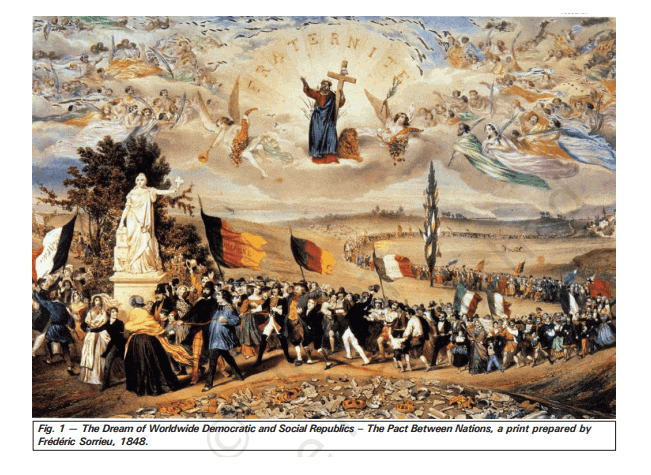Class 10 Exam > Class 10 Questions > Which of the following did the European conse...
Start Learning for Free
Which of the following did the European conservatives not believe in?
- a)Traditional institution of state policy
- b)Strengthened monarchy
- c)A return to a society of pre-revolutionary days
- d)None of these
Correct answer is option 'C'. Can you explain this answer?
| FREE This question is part of | Download PDF Attempt this Test |
Verified Answer
Which of the following did the European conservatives not believe in?a...
European conservatives did NOT believe in: “A return to a society of pre-revolutionary days”
• Belief: The conservatives held the belief that established, traditional institutions of state and society like monarchy, church, social hierarchies, property, and family must be protected and preserved.

View all questions of this test
• Spirit of Conservatism: European governments were driven by the spirit of Conservatism after the defeat of Napoleon in 1815.
• Belief: The conservatives held the belief that established, traditional institutions of state and society like monarchy, church, social hierarchies, property, and family must be protected and preserved.

• Impact of Modernization: They also realized that modernization could strengthen traditional institutions like the monarchy and a return to the society of the pre-revolutionary days was not required.
• Hence, most conservatives did not advocate a return to pre-revolutionary society. They realized that the changes brought on by Napoleon could potentially improve traditional institutions such as the monarchy. State powers will become more successful and powerful as a result.
So, the Correct Answer is C
You can study in detail about European Conservatives & The Rise of Nationalism in Europe by going through the link:
Most Upvoted Answer
Which of the following did the European conservatives not believe in?a...
European Conservatives believed in Monarchy. They were against the revolutionary ideas and ideals. They wanted the state or nation to be ruled by a monarch and the common people cannot have a say in the formation or decision making. So option (c) is correct
Free Test
FREE
| Start Free Test |
Community Answer
Which of the following did the European conservatives not believe in?a...
European conservatives believed in certain traditional values and institutions. Let's take a look at each option:
a) Traditional institution of state policy: Conservatives believed in maintaining the traditional institutions of the state such as the monarchy, aristocracy, and the Church.
b) Strengthened monarchy: Conservatives believed in a strong and centralized monarchy as a symbol of stability and order. They saw the monarchy as a unifying force that could prevent chaos and maintain social hierarchy.
c) A return to a society of pre-revolutionary days: This option is incorrect. Conservatives did not believe in a return to a society of pre-revolutionary days as they saw the French Revolution and other revolutionary movements as destructive forces that threatened the traditional institutions of the state.
d) None of these: This option is incorrect as we have already established that conservatives believed in traditional institutions and a strong monarchy.
Therefore, the correct answer is option C, as European conservatives did not believe in a return to a society of pre-revolutionary days.
a) Traditional institution of state policy: Conservatives believed in maintaining the traditional institutions of the state such as the monarchy, aristocracy, and the Church.
b) Strengthened monarchy: Conservatives believed in a strong and centralized monarchy as a symbol of stability and order. They saw the monarchy as a unifying force that could prevent chaos and maintain social hierarchy.
c) A return to a society of pre-revolutionary days: This option is incorrect. Conservatives did not believe in a return to a society of pre-revolutionary days as they saw the French Revolution and other revolutionary movements as destructive forces that threatened the traditional institutions of the state.
d) None of these: This option is incorrect as we have already established that conservatives believed in traditional institutions and a strong monarchy.
Therefore, the correct answer is option C, as European conservatives did not believe in a return to a society of pre-revolutionary days.
Attention Class 10 Students!
To make sure you are not studying endlessly, EduRev has designed Class 10 study material, with Structured Courses, Videos, & Test Series. Plus get personalized analysis, doubt solving and improvement plans to achieve a great score in Class 10.

|
Explore Courses for Class 10 exam
|

|
Similar Class 10 Doubts
Which of the following did the European conservatives not believe in?a)Traditional institution of state policyb)Strengthened monarchyc)A return to a society of pre-revolutionary daysd)None of theseCorrect answer is option 'C'. Can you explain this answer?
Question Description
Which of the following did the European conservatives not believe in?a)Traditional institution of state policyb)Strengthened monarchyc)A return to a society of pre-revolutionary daysd)None of theseCorrect answer is option 'C'. Can you explain this answer? for Class 10 2024 is part of Class 10 preparation. The Question and answers have been prepared according to the Class 10 exam syllabus. Information about Which of the following did the European conservatives not believe in?a)Traditional institution of state policyb)Strengthened monarchyc)A return to a society of pre-revolutionary daysd)None of theseCorrect answer is option 'C'. Can you explain this answer? covers all topics & solutions for Class 10 2024 Exam. Find important definitions, questions, meanings, examples, exercises and tests below for Which of the following did the European conservatives not believe in?a)Traditional institution of state policyb)Strengthened monarchyc)A return to a society of pre-revolutionary daysd)None of theseCorrect answer is option 'C'. Can you explain this answer?.
Which of the following did the European conservatives not believe in?a)Traditional institution of state policyb)Strengthened monarchyc)A return to a society of pre-revolutionary daysd)None of theseCorrect answer is option 'C'. Can you explain this answer? for Class 10 2024 is part of Class 10 preparation. The Question and answers have been prepared according to the Class 10 exam syllabus. Information about Which of the following did the European conservatives not believe in?a)Traditional institution of state policyb)Strengthened monarchyc)A return to a society of pre-revolutionary daysd)None of theseCorrect answer is option 'C'. Can you explain this answer? covers all topics & solutions for Class 10 2024 Exam. Find important definitions, questions, meanings, examples, exercises and tests below for Which of the following did the European conservatives not believe in?a)Traditional institution of state policyb)Strengthened monarchyc)A return to a society of pre-revolutionary daysd)None of theseCorrect answer is option 'C'. Can you explain this answer?.
Solutions for Which of the following did the European conservatives not believe in?a)Traditional institution of state policyb)Strengthened monarchyc)A return to a society of pre-revolutionary daysd)None of theseCorrect answer is option 'C'. Can you explain this answer? in English & in Hindi are available as part of our courses for Class 10.
Download more important topics, notes, lectures and mock test series for Class 10 Exam by signing up for free.
Here you can find the meaning of Which of the following did the European conservatives not believe in?a)Traditional institution of state policyb)Strengthened monarchyc)A return to a society of pre-revolutionary daysd)None of theseCorrect answer is option 'C'. Can you explain this answer? defined & explained in the simplest way possible. Besides giving the explanation of
Which of the following did the European conservatives not believe in?a)Traditional institution of state policyb)Strengthened monarchyc)A return to a society of pre-revolutionary daysd)None of theseCorrect answer is option 'C'. Can you explain this answer?, a detailed solution for Which of the following did the European conservatives not believe in?a)Traditional institution of state policyb)Strengthened monarchyc)A return to a society of pre-revolutionary daysd)None of theseCorrect answer is option 'C'. Can you explain this answer? has been provided alongside types of Which of the following did the European conservatives not believe in?a)Traditional institution of state policyb)Strengthened monarchyc)A return to a society of pre-revolutionary daysd)None of theseCorrect answer is option 'C'. Can you explain this answer? theory, EduRev gives you an
ample number of questions to practice Which of the following did the European conservatives not believe in?a)Traditional institution of state policyb)Strengthened monarchyc)A return to a society of pre-revolutionary daysd)None of theseCorrect answer is option 'C'. Can you explain this answer? tests, examples and also practice Class 10 tests.

|
Explore Courses for Class 10 exam
|

|
Suggested Free Tests
Signup for Free!
Signup to see your scores go up within 7 days! Learn & Practice with 1000+ FREE Notes, Videos & Tests.

























